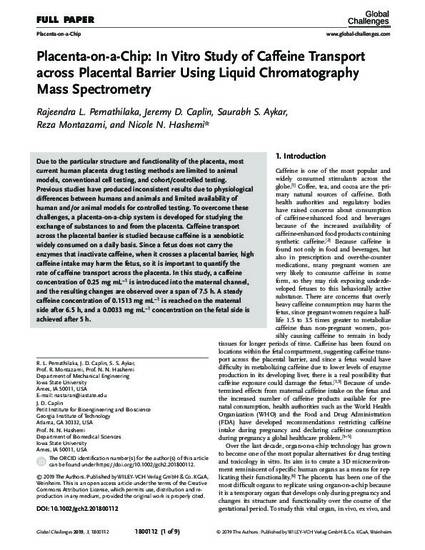
Due to the particular structure and functionality of the placenta, most current human placenta drug testing methods are limited to animal models, conventional cell testing, and cohort/controlled testing. Previous studies have produced inconsistent results due to physiological differences between humans and animals and limited availability of human and/or animal models for controlled testing. To overcome these challenges, a placenta‐on‐a‐chip system is developed for studying the exchange of substances to and from the placenta. Caffeine transport across the placental barrier is studied because caffeine is a xenobiotic widely consumed on a daily basis. Since a fetus does not carry the enzymes that inactivate caffeine, when it crosses a placental barrier, high caffeine intake may harm the fetus, so it is important to quantify the rate of caffeine transport across the placenta. In this study, a caffeine concentration of 0.25 mg mL−1 is introduced into the maternal channel, and the resulting changes are observed over a span of 7.5 h. A steady caffeine concentration of 0.1513 mg mL−1 is reached on the maternal side after 6.5 h, and a 0.0033 mg mL−1 concentration on the fetal side is achieved after 5 h.
Available at: http://works.bepress.com/nastaran_hashemi/44/

This is the published version of the following article: Pemathilaka, Rajeendra L., Jeremy D. Caplin, Saurabh S. Aykar, Reza Montazami, and Nicole N. Hashemi. "Placenta‐on‐a‐Chip: In Vitro Study of Caffeine Transport across Placental Barrier Using Liquid Chromatography Mass Spectrometry." Global Challenges (2019): 1800112. DOI: 10.1002/gch2.201800112. Posted with permission.